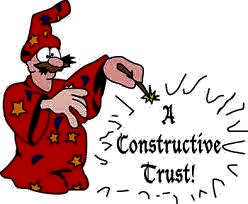Understanding What Is A Constructive Trust and Its Role in Equity Cases
Understanding What Is A Constructive Trust and Its Role in Equity Cases
Blog Article
Recognizing What Is a Useful Trust and Its Effects in Legal Matters
A useful count on is a nuanced lawful concept developed to deal with situations where residential or commercial property has been obtained under conditions that call for fair treatment. This treatment serves to avoid unfair enrichment and is particularly essential in situations involving fraud, breaches of fiduciary responsibility, and family regulation conflicts. As we check out the fundamental aspects of constructive trust funds, including their essential features and applications, one have to think about the profound effects these trust funds can carry building disagreements and ownership legal rights, increasing essential inquiries concerning justice and equity in lawful contexts.
Interpretation of Constructive Count On
A useful trust is a lawful remedy that occurs by operation of regulation, instead of via specific contract in between parties. It is usually enforced by a court to deal with circumstances where one party has actually wrongfully gotten or holds property that truly belongs to another. The core principle underlying a useful trust fund is the avoidance of unfair enrichment, guaranteeing that individuals do not gain from their wrongful acts at the cost of another's civil liberties.

Unlike share trusts, which are created by the specific intention of the events entailed, useful trust funds develop from the scenarios and carry out bordering the residential or commercial property in concern. This unique nature stresses the fair considerations that courts have to consider in figuring out the rightful possession of residential property and ensuring justice is served.
Secret Features
Constructive trusts possess a number of essential qualities that differentiate them from other forms of residential property possession and trust setups. Largely, positive trusts are not established by specific contract or formal declaration; instead, they arise by procedure of regulation to resolve circumstances of unjustified enrichment or wrongful conduct. This characteristic emphasizes their therapeutic nature, typically implemented to guarantee justness and equity when one party holds property that, in justice, ought to belong to another.
One more remarkable aspect is their focus on the connection between the celebrations included, normally highlighting a fiduciary obligation or a breach of count on (What Is A Constructive Trust). Useful counts on require a connection that gives surge to an obligation, such as that between companions or fiduciaries, reinforcing the ethical commitment to act in the ideal interest of others
Additionally, the residential property based on a positive count on is generally identifiable, as it must be certain or traceable. This recognition is important for making sure and implementing the trust that the hurt celebration can reclaim their rightful passion. Positive trusts can be used to different types of possessions, consisting of real estate and individual building, making them versatile tools in addressing lawful conflicts.
Legal Applications
The application of useful depends on in legal contexts is significant and wide, usually functioning as a vital system for correcting injustices in numerous situations. Constructive trust funds are commonly enforced by courts to deal with circumstances where one party has wrongfully benefited at the expenditure of an additional, thus preventing unjust enrichment.
One primary lawful application is in situations of fraud or breach of fiduciary duty. As an example, if a trustee abuses trust assets for personal gain, a court may impose a useful depend guarantee that the possessions are gone back to the rightful recipients. This stops the trustee from benefiting from their transgression.
In addition, positive depends on are appropriate in household regulation, specifically in divorce process. When one spouse has actually added to the acquisition of marital property, however the title is entirely in the other spouse's name, a court might establish a constructive depend acknowledge the non-titled partner's fair interest.
In addition, positive trust funds can apply in inheritance disagreements, where a decedent's purposes are not mirrored in the official will. In such cases, this contact form the court might impose a constructive depend recognize the decedent's real wishes. Generally, useful trust funds play an important duty in promoting fairness and justice in numerous legal matters.

Effects for Building Conflicts
Navigating home disagreements often includes the application of positive depends on, which can give fair remedies in intricate possession situations. When parties are taken part in a conflict over property, the courts might impose a useful trust fund to protect against unjustified enrichment and to ensure that the residential property is held for the advantage of the rightful owner, even if legal title remains in an additional's name.
Useful trusts are specifically appropriate in instances where there is proof of a common objective to share home, such as in relationships where one event contributes economically to a possession gotten in the other's name. This count on offers as a solution that identifies the payments made by one celebration and addresses prospective imbalances arising from the lawful titleholder's activities.
Furthermore, positive trusts can play a pivotal role in dealing with disputes developing from fraud, misstatement, or breach of fiduciary duty, where one event wrongfully acquires residential or commercial property at the expense of another. By enforcing a constructive trust, courts can recover equity and clear up possession civil liberties, eventually promoting reasonable end results and minimizing the likelihood of prolonged lawsuits. What Is A Constructive Trust. Thus, constructive depends on are necessary tools in the resolution of building conflicts, advertising justice and stability in ownership matters
How to Develop a Useful Trust
Establishing a positive trust fund requires demonstrating details components that suggest the requirement for equitable alleviation. Largely, a complaintant needs to reveal that the accused holds building under circumstances that necessitate a commitment to convey it to the claimant. This typically includes showing that the building was acquired by the defendant via wrongful conduct, such as scams, breach of fiduciary duty, or unjustified enrichment.
In addition, navigate here it is necessary to develop a partnership between the events that sustains the charge of a positive depend on; this can include fiduciary relationships, joint ventures, or other joint collaborations. The complaintant must additionally show that they have a rightful claim to the home in inquiry, which often entails giving proof of their contribution to the acquisition or improvement of the building.
Once these aspects are developed, the court can enforce a positive trust as a remedy, consequently enabling the plaintiff to recover the property or its worth. Eventually, effective facility of a constructive depend on depends upon clear proof of the wrongful conduct and the fair concepts that necessitate such a depend on, making certain that justice dominates in residential or commercial property disagreements.
Final Thought
In verdict, a useful trust works as a vital legal device to fix situations of wrongful building procurement and stop unjust enrichment. Its application across different legal contexts, including fraudulence and family law conflicts, underscores its relevance in promoting fair end results. By clarifying possession rights and offering treatments for hurt parties, positive trusts boost the honesty of residential or commercial property legislation and ensure that justice prevails in complex ownership circumstances. Comprehending their effects is vital for browsing lawful issues effectively.
As we check out the foundational elements of useful counts on, including their key characteristics and applications, one have to think about the profound ramifications these counts on can have on building conflicts and possession legal rights, increasing crucial inquiries concerning justice and equity in lawful contexts. What Is A Constructive Trust.
Useful trusts have a number of essential attributes that identify them from other kinds of building possession and depend on arrangements. Positive counts on can be applied to numerous types of assets, including genuine estate and individual residential or commercial property, making them versatile devices in attending to lawful conflicts.
If a trustee misuses depend on assets for personal gain, a court might enforce a positive trust fund to guarantee that the properties are returned to the rightful beneficiaries.In conclusion, a positive trust fund offers as an essential lawful system to fix circumstances of wrongful property acquisition and he has a good point avoid unjust enrichment.
Report this page